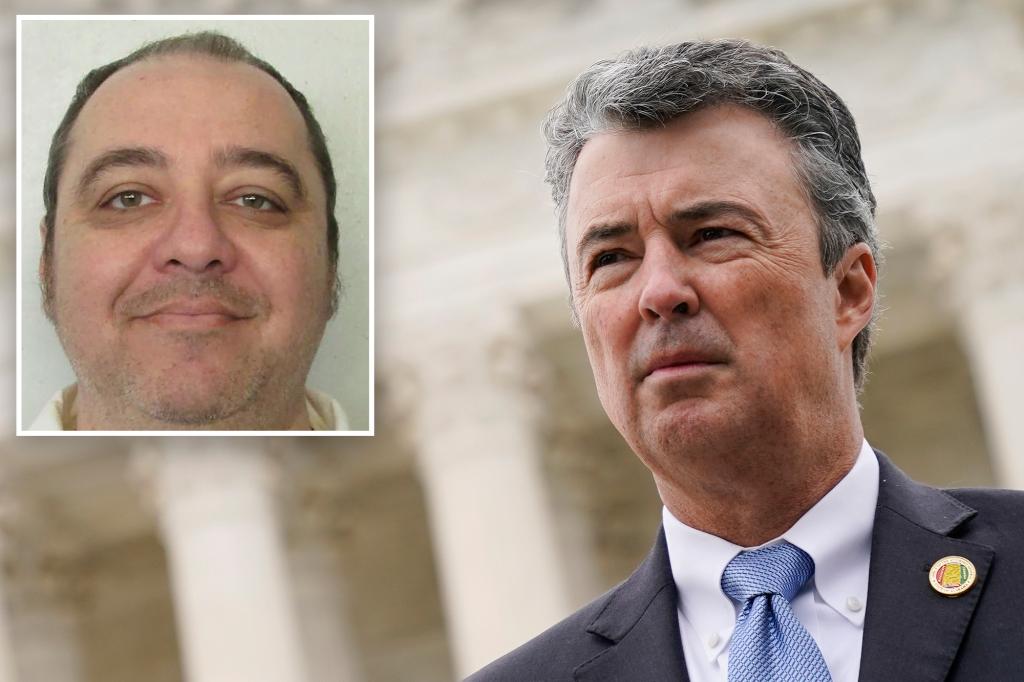MONTGOMERY, Alabama — Alabama will be allowed to execute an inmate with nitrogen gas later this month, a federal judge ruled Wednesday, clearing the way for what would be the first execution in the country under a new method that attorneys for the inmate criticized as cruel and experimental.
U.S. District Judge R. Austin Huffaker denied Alabama inmate Kenneth Eugene Smith’s request for a preliminary injunction to stop his scheduled Jan. 25 execution for nitrogen hypoxia.
Smith’s lawyers have said Alabama is trying to make Smith the “test subject” for an untested execution method after he survived the state’s previous attempt to execute him by lethal injection.
Robert Grass, the inmate’s attorney, said his team will appeal the decision but declined to comment further.
Alabama Attorney General Steve Marshall’s office was expected to issue a statement Wednesday afternoon.
The question of whether the planned execution can ultimately go ahead could end up before the U.S. Supreme Court.
Kenneth Eugene Smith requested a preliminary injunction to stop his nitrogen hypoxia scheduled for January 25. AP
The state’s plans call for placing a respirator-type mask over Smith’s nose and mouth to replace breathable air with nitrogen, which caused his death from lack of oxygen.
Three states (Alabama, Mississippi and Oklahoma) have authorized nitrogen hypoxia as an execution method, but no state has attempted to use it so far.
Smith’s lawyers had argued that the new protocol is riddled with unknowns and potential problems that violate the constitutional ban on cruel and unusual punishment.
Huffaker acknowledged that execution by nitrogen hypoxia is a new method, but noted that lethal injection, now the most common execution method in the country, was once new as well.
He said that while Smith had demonstrated theoretical risks of pain and suffering under state protocol, those risks do not constitute an unconstitutional violation.
“Smith is not guaranteed a painless death. On this record, Smith has not shown, and the court cannot conclude, that the Protocol inflicts cruel and unusual punishment that renders it constitutionally invalid under the current legal framework,” Huffaker wrote in the 48-page ruling.
Alabama Attorney General Steve Marshall answers questions outside the Supreme Court. AP
Huffaker also wrote that there was insufficient evidence to find that the protocol “is highly likely to cause Smith additional pain before death or prolonged death.”
Smith, now 58, was one of two men convicted of the 1988 murder-for-hire of a preacher’s wife, which shook a small north Alabama community.
Prosecutors said Smith and the other man were paid $1,000 each to kill Elizabeth Sennett on behalf of her husband, who was deeply in debt and wanted to collect on the insurance.
Start your day with everything you need to know
Morning Report delivers the latest news, videos, photos and more.
Smith survived the state’s previous attempt to execute him.
The Alabama Department of Corrections attempted to give Smith a lethal injection in 2022, but canceled it when authorities could not connect the two IVs needed to continue.
The judge’s ruling allowing the nitrogen enforcement plan to move forward came after a court hearing in December and legal filings in which attorneys for Smith and Alabama gave divergent descriptions of the risks and humanity of death from exposure. to nitrogen gas.
The state attorney general’s office had argued that oxygen deprivation “would cause unconsciousness in seconds and death in minutes.”
Their court papers compared the new execution method to industrial accidents in which people fainted and died after exposure to nitrogen gas.
But Smith’s attorneys noted in court papers that the American Veterinary Medical Association wrote euthanasia guidelines in 2020 that stated that nitrogen hypoxia is an acceptable method of euthanasia for pigs, but not other mammals, because it could create a ” anoxic environment that is distressing for some species.”
Smith’s attorneys also argued that the gas mask, which fits over the nose and mouth, would interfere with Smith’s ability to pray out loud or make a final statement before witnesses in his final moments.
The attorney general’s office called those concerns speculative.
Marshall’s office was expected to issue a statement Wednesday. AP
Alabama’s prison system agreed to minor changes to allay concerns that Smith’s spiritual advisor would not be able to care for him before the execution.
The state wrote that the spiritual advisor could enter the execution chamber before the mask was placed on Smith’s face to pray with him and anoint him with oil.
Murder victim Sennett was found dead on March 18, 1988 in the home she shared with her husband Charles Sennett Sr. in Colbert County, Alabama.
The coroner testified that the 45-year-old woman had been stabbed repeatedly.
Her husband, then a pastor at Westside Church of Christ, committed suicide when the murder investigation focused on him as a suspect, according to court documents.
Smith’s initial conviction in 1989 was overturned on appeal. He was retried and convicted again in 1996.
The jury recommended life in prison by a vote of 11 to 1, but a judge overturned the recommendation and sentenced Smith to death. Alabama no longer allows a judge to overrule a jury in death penalty decisions.
John Forrest Parker, the other man convicted in the case, was executed in 2010.
Categories: Trending
Source: vtt.edu.vn
